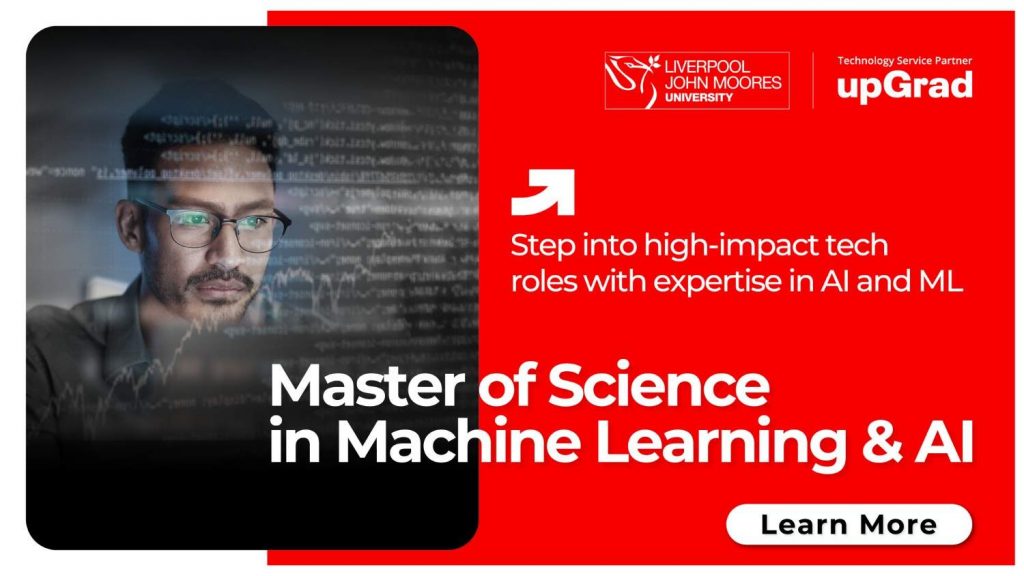In an era where machines are learning faster than ever, it might seem like there’s no job safe from automation. Yet when we look closely, some roles still stand out as resilient; what we might call the jobs AI can’t replace. In fact, research by Goldman Sachs Research estimates that even with broad AI adoption, only about 6-7% of U.S. jobs could be displaced over the next decade. This blog examines the professions that remain distinctly human, highlighting where empathy, creativity, and critical thinking continue to surpass the capabilities of algorithms.
Source: Goldman Sachs, as of August 13, 2025
Take your skills to the next level — Explore AI & ML Certification Online for Working Professionals
Understanding Jobs AI Can’t Replace in the U.S.
Why Some Jobs Are Hard for AI to Replace
Certain professions are naturally resistant to automation because they require more than technical precision. Here’s what makes them challenging for AI to replace:
- Contextual Awareness: Humans understand nuance, tone, and cultural meaning.
- Ethical Decision-Making: Many roles require moral reasoning beyond the use of algorithms.
- Empathy and Trust-Building: Relationships and emotions play a significant role in many service-based jobs.
- Creative Spontaneity: Innovation often happens through intuition, not code.
Together, these qualities make human work irreplaceable in areas that depend on sensitivity, originality, and ethical responsibility.
Key Traits of AI-Resistant Careers
AI-resistant careers possess specific qualities that give humans a competitive edge in an increasingly automated world. These include:
- Judgment Under Uncertainty: Handling ambiguous or emotional situations with balance.
- Interpersonal Communication: Understanding body language, tone, and intent.
- Cultural Sensitivity: Responding appropriately to diverse human experiences.
- Strategic Thinking: Seeing the big picture and connecting multiple variables.
These traits remind us that future-proof careers aren’t just about skill — they’re about emotional depth and adaptability.
Also read: Artificial Intelligence: A Beginner’s Guide
Top Jobs in the U.S. That AI Can’t Replace
Despite rapid advances in automation, many professions in the U.S. remain deeply rooted in human creativity, empathy, and complex reasoning. These roles demand qualities beyond algorithms — emotional understanding, ethical judgment, and personal interaction — making them largely AI-proof careers.
Have a look at the jobs AI can’t replace in the U.S. workforce:
| Job Title | Industry | Reason AI Can’t Replace It |
| Physician/Surgeon | Healthcare | Requires empathy, intuition, and patient trust. |
| Psychologist/Therapist | Mental Health | Relies on emotional connection and human insight. |
| Teacher/Professor | Education | Needs adaptability, mentoring, and human guidance. |
| Social Worker | Social Services | Involves compassion, ethics, and emotional support. |
| Creative Director | Media & Advertising | Driven by innovation, storytelling, and imagination. |
| Electrician/Plumber | Skilled Trades | Requires manual precision and problem-solving. |
| Marketing Manager | Business & Advertising | Combines creativity, strategy, and emotional intelligence. |
| Lawyer/Legal Advisor | Legal | Depends on critical reasoning and ethical judgment. |
| HR Manager | Human Resources | Needs empathy and interpersonal skills for people management. |
| Executive/CEO | Leadership | Involves strategic vision, emotional intelligence, and decision-making. |
Also read: Benefits of Generative AI for US Developers
Industries with the Lowest Risk of AI Automation
While AI continues to reshape global industries, specific sectors remain far less likely to be fully automated. These industries depend on creativity, human judgment, and emotional intelligence — areas where machines still fall short.
Listed below are a few examples of what jobs AI will not replace:
- Healthcare and Social Work: Medical professionals, therapists, and caregivers rely on empathy and complex decision-making.
- Education: Teachers and trainers inspire, mentor, and adapt to individual learning needs — not something AI can truly mimic.
- Creative Fields: Writers, designers, and filmmakers thrive on originality and emotion.
- Skilled Trades: Electricians, carpenters, and mechanics require physical precision and on-site adaptability.
- Leadership Roles: Managers and executives navigate relationships, strategy, and ethics.
These industries show that the future of work will always need the human touch — supported, not replaced, by AI.

Skills to Build for an AI-Resilient Career
As AI transforms the workplace, the best way to stay ahead is by strengthening the qualities that make us distinctly human. These skills enable you to adapt, lead, and remain relevant regardless of how technology evolves.
The table highlights the main skills to build for an AI-resilient career:
| Skill | Description |
| Emotional Intelligence | Connecting with people and understanding their needs. |
| Creative Thinking | Generating fresh ideas where logic falls short. |
| Critical Reasoning | Analyzing complex problems beyond data patterns. |
| Adaptability | Embracing change and learning new tools quickly. |
| Collaboration and Communication | Working seamlessly with a diverse team. |
How AI Is Creating New Career Opportunities
AI isn’t just automating jobs; it’s reshaping the workforce and opening new career paths. Professionals who adapt are finding exciting opportunities in roles that combine human insight with technology. Some fast-growing fields include:
- AI Prompt Engineering: Crafting effective inputs for AI systems
- Data Analysis and Interpretation: Turning raw data into strategic insights
- Cybersecurity: Protecting AI-driven systems from threats
- AI ethics and Compliance: Ensuring responsible technology use
- Human-AI Collaboration Design: improving user experiences
So instead of asking what jobs AI will not replace, the real question is how you’ll grow alongside it.
Also read: Top AI Jobs in the US: Most Wanted Artificial Intelligence Roles with Salary Ranges & Career Paths
Common Misconceptions About AI and Job Loss
AI is changing how we work, but it’s not taking over every job. Many people misunderstand its impact. Let’s clear up a few myths:
- AI won’t take all jobs: It mainly handles repetitive or data-heavy tasks.
- You don’t need to be in tech: Every profession can adapt and work alongside AI.
- Humans are still vital: Creativity, empathy, and ethics can’t be automated.
- Job loss isn’t instant: There’s time to learn and reskill.
In truth, there are still plenty of jobs that AI can’t replace, especially those centered on human connection.
Also read: How will Artificial Intelligence Affect Jobs 2025-2030
How upGrad Helps You Build a Future-Proof Career
In a world where AI and automation are redefining industries, upGrad empowers you to stay ahead with skills that truly matter. Its industry-aligned online courses, expert mentorship, and flexible learning model help you adapt, grow, and thrive in the digital economy. Whether you want to upskill, switch careers, or future-proof your job, upGrad offers globally recognized programs designed to match real-world needs. Don’t just keep up with change — lead it.
Enroll today via upGrad, the world’s leading online learning platform, and take the first step toward building a smarter, future-ready career.
Explore these popular online courses through upGrad:
- Master of Science in Data Science from Liverpool John Moores University
- Executive Diploma in Machine Learning and AI with IIIT-B
Must read articles:
- Understanding Recurrent Neural Networks: Applications and Examples
- From Novice to Neural Network: A Beginner’s Guide to Learn AI and ML
- Key Details to Know about Neural Networks and Deep Learning
- Top AI and ML Certifications to Boost Your Career in the US
🎓 Explore Our Top-Rated Courses in United States
Take the next step in your career with industry-relevant online courses designed for working professionals in the United States.
- DBA Courses in United States
- Data Science Courses in United States
- MBA Courses in United States
- AI ML Courses in United States
- Digital Marketing Courses in United States
- Product Management Courses in United States
- Generative AI Courses in United States
FAQs on Jobs That Can’t Be Replaced by AI
No job is 100% immune, but some roles are highly resistant to automation. Examples of jobs that AI can’t replace include:
Teachers
Psychologists
Healthcare Professionals
Social Workers
Skilled Tradespeople
AI can assist with ideas or drafts, but creativity rooted in emotion, storytelling, and human experience remains irreplaceable. So, when it comes to what jobs will AI not replace, creative professions still hold their ground.
Developing skills that machines can’t easily mimic helps you stay future-ready, such as:
1. Emotional intelligence
2. Critical thinking
3. Creativity
4. Complex problem-solving
5. Relationship management
AI supports diagnostics and data analysis, but can’t replace human empathy, ethical judgment, or patient care. Most healthcare roles, especially nursing and therapy, are among the jobs that AI can’t replace in the near future.
Adaptability is key—embrace lifelong learning, upgrade digital literacy, and build interpersonal skills. Focus on what jobs AI will not replace, and align your career path with human-centric, creative, or emotionally driven roles.
Sources:
- https://www.tecmint.com/jobs-ai-cant-take-over
- https://www.forbes.com/sites/carolinecastrillon/2025/06/16/build-ai-skills-become-irreplaceable-at-work












.png)







